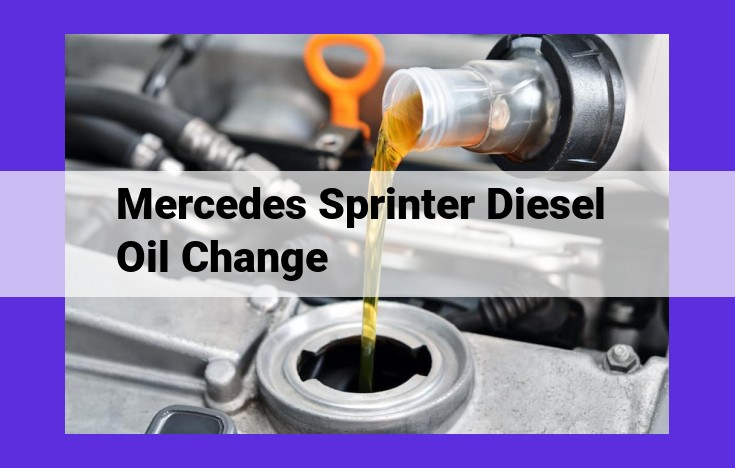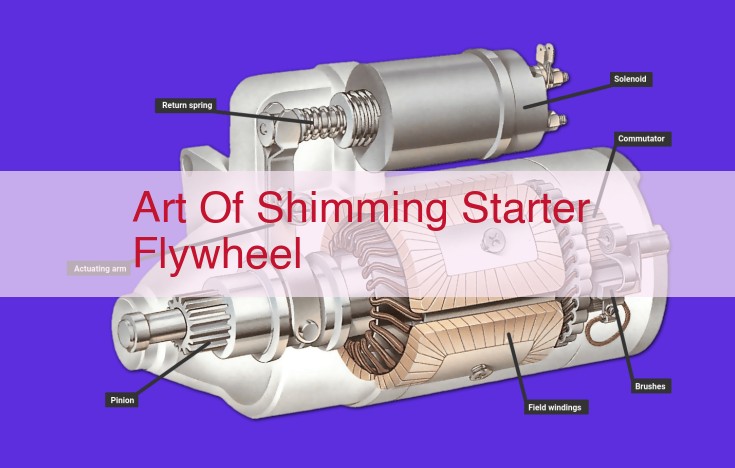Mercedes Sprinter’s diesel engines require specialized oil due to their unique characteristics. Selecting the right viscosity and change interval is crucial. The correct oil filter type, be it cartridge or spin-on, along with the capacity for different engines, should be considered. Safety precautions ensure a smooth and hazard-free procedure. A step-by-step guide assists with the oil drain, filter replacement, and refill. Troubleshooting tips address potential issues like oil leaks, filter concerns, and engine noises, ensuring a successful oil change for optimal engine performance and longevity.
Diesel Engine Oil:
- Explain the specialized nature of diesel engine oil and its differences from gasoline engine oil.
- Discuss the additives in diesel engine oil that address specific characteristics of diesel engines.
Diesel Engine Oil: The Specialized Lubricant for Peak Performance
Diesel engines demand a specialized type of engine oil that differs significantly from gasoline engine oil. The robust nature of diesel engines, with their higher compression ratios and combustion temperatures, poses unique challenges to the oil. To meet these demands, diesel engine oil is meticulously formulated with specialized additives that address the unique characteristics of diesel engines. These additives combat the formation of soot and other combustion-related contaminants, ensuring optimal engine performance and longevity.
Viscosity: A Critical Factor for Diesel Engine Oil
The viscosity of engine oil, measured by SAE grades, is a crucial factor in selecting the right oil for your Mercedes Sprinter. Viscosity refers to the oil’s resistance to flow. Thicker oils (higher SAE numbers) provide better protection at high temperatures, while thinner oils (lower SAE numbers) flow more easily at low temperatures. Choosing the appropriate viscosity is essential for maintaining proper lubrication under varying operating conditions.
Change Interval: Monitoring for Optimal Oil Life
The frequency of oil changes depends on several factors, including mileage, operating conditions, and the presence of oil monitoring systems. Monitoring systems, such as those found in modern Mercedes Sprinters, track oil quality and provide alerts when an oil change is necessary. By following the recommended change intervals or relying on monitoring systems, you ensure that your engine is always protected with fresh, clean oil.
Oil Filter: The Unsung Hero of Engine Health
Mercedes Sprinters utilize two types of oil filters: cartridge filters and spin-on filters. Both types effectively remove contaminants from the oil. However, it’s critical to use the correct filter type specified for your vehicle and to replace it regularly to maintain optimal filtration efficiency. Bypass filters play a vital role in ensuring continuous oil flow in the event of a primary filter blockage.
Oil Capacity: Meeting the Engine’s Lubrication Needs
The oil capacity varies depending on the Mercedes Sprinter engine type. Always consult the owner’s manual for the precise amount of oil required. Using the correct oil capacity ensures adequate lubrication and prevents overfilling, which can lead to performance issues.
Viscosity:
- Describe the viscosity rating system (SAE grades) and its importance in oil selection.
- Explain the implications of lower and higher viscosity numbers for cold and high-temperature performance.
Oil Viscosity: Understanding the ABCs of Lubrication for Your Mercedes Sprinter
Viscosity, a crucial aspect of engine oil, plays a pivotal role in protecting your Mercedes Sprinter’s vital components. Imagine it as the oil’s thickness or resistance to flow. The Society of Automotive Engineers (SAE) classifies oil viscosity into grades denoted by numbers and letters.
The lower the SAE number, the thinner the oil and the more easily it flows. This is ideal for cold weather, as it allows oil to circulate quickly through the engine, reducing wear and tear during startup. Conversely, a higher SAE grade indicates a thicker oil that flows slowly. This is better suited for higher temperatures, providing a stronger protective barrier against friction and wear.
Choosing the correct viscosity oil is essential for optimal engine performance. Using a too thin oil in cold weather may result in insufficient lubrication, while using a too thick oil in hot weather can lead to increased friction and higher fuel consumption. Therefore, it’s crucial to consult your vehicle’s owner’s manual for the recommended viscosity grade and adhere to it for the best results.
Oil Change Intervals for Mercedes Sprinters: A Comprehensive Guide
Understanding the optimal oil change interval for your Mercedes Sprinter is crucial for maintaining its engine’s health and performance. Several factors influence when you should replace your oil, and it’s essential to be aware of these considerations to ensure your vehicle operates smoothly and efficiently.
Mileage
One of the primary factors that determine your oil change interval is mileage. Vehicle manufacturers typically recommend changing your oil every 5,000 to 7,500 miles for gasoline engines. However, for diesel engines like those found in Mercedes Sprinters, the recommended interval is typically shorter, ranging from every 3,000 to 5,000 miles. This is because diesel engines produce more soot and contaminants that can accumulate in the oil, reducing its effectiveness and potentially damaging the engine.
Operating Conditions
The way you drive your Mercedes Sprinter also plays a significant role in determining how often you need an oil change. If you frequently drive in stop-and-go traffic, tow heavy loads, or operate your Sprinter in extreme temperatures, your oil will degrade more rapidly. Under these severe operating conditions, you may need to change your oil every 3,000 miles or less.
Monitoring Systems
Some newer Mercedes Sprinter models are equipped with oil life monitoring systems that track the condition of your oil and alert you when it’s time for a change. These systems consider driving conditions, engine temperature, and other factors to provide an accurate estimate of your oil’s remaining life. Relying on these systems can help you avoid premature oil changes and extend the intervals between services.
Ultimately, the best way to determine the optimal oil change interval for your Mercedes Sprinter is to consult your vehicle’s owner’s manual. The manufacturer’s recommendations will provide the most accurate guidance based on the specific characteristics of your vehicle and its engine.
Oil Filters for Mercedes Sprinters: Ensuring Engine Health
In the world of automotive maintenance, oil filters play a crucial role in protecting your engine’s health. For Mercedes Sprinters, selecting the right oil filter is essential to maintain optimal performance.
Types of Oil Filters
Mercedes Sprinters utilize two primary types of oil filters: cartridge and spin-on filters. Cartridge filters, housed within a metal or plastic casing, are designed for specific engine models and provide a high level of filtration efficiency. Spin-on filters, on the other hand, are threaded onto a filter base and offer a more cost-effective option.
Importance of Correct Filter Type
Using the correct oil filter type is paramount for proper engine function. Matching the filter’s specifications to your Mercedes Sprinter’s engine ensures optimal filtration and prevents potential damage. Incorrect filter selection can lead to reduced oil flow, diminished filtration capacity, and engine wear.
Role of Bypass Filters
Some Mercedes Sprinters are equipped with a bypass filter. This filter serves as a safety measure to prevent unfiltered oil from reaching the engine in the event of a primary oil filter failure. Bypass filters ensure that your engine continues to receive lubrication, albeit with reduced filtration efficiency, allowing you to safely drive to a service center.
Choosing the Right Filter
When selecting an oil filter for your Mercedes Sprinter, it’s imperative to consult your owner’s manual or a trusted mechanic. They will provide you with the specifications for the correct oil filter type and ensure compatibility with your Sprinter’s engine. Opting for high-quality filters from reputable manufacturers is crucial for optimal filtration and engine protection.
Oil Capacity in Mercedes Sprinters: A Comprehensive Guide
When it comes to maintaining your Mercedes Sprinter, ensuring proper oil levels is crucial. Oil capacity varies depending on the engine type, so it’s essential to refer to the owner’s manual for the exact specifications.
Diesel Sprinter Engines:
- 2.1L I4 Diesel: Typically requires around 5.5 liters of oil.
- 3.0L V6 Diesel: Usually holds approximately 8.5 liters.
Gasoline Sprinter Engines:
- 1.8L I4 Gasoline: Requires approximately 5 liters of oil.
- 3.5L V6 Gasoline: Generally holds around 7.5 liters.
It’s important to note that these figures are approximate, and double-checking the owner’s manual is highly recommended to ensure you have the most accurate information for your specific vehicle. Maintaining proper oil levels helps prevent engine damage and extends the life of your Mercedes Sprinter.
Essential Parts for a Flawless Mercedes Sprinter Oil Change
Preparing for your Mercedes Sprinter’s oil change? Mark these essential parts off your checklist:
The Life-Giving Blood: Engine Oil
- Select the diesel engine oil tailored to your Sprinter’s specific needs. These specialized oils pack additives that shield your engine from the unique demands of diesel combustion.
Viscosity: The Flow of Power
- Your oil’s viscosity, rated by SAE grades, plays a crucial role in performance. Lower numbers ensure smooth circulation in frigid temperatures, while higher numbers protect against thinning at soaring temperatures.
Time to Refresh: Oil Filter
- Your choice of filter depends on your Sprinter’s make and model. Opt for either a cartridge or spin-on filter that perfectly fits the engine. Don’t forget the bypass filter to guard your oil from contamination.
Precise Measurement: Oil Capacity
- The oil capacity varies with different Mercedes Sprinter engines. Check your owner’s manual for the exact amount.
The Safety Gear Guardians
- Safety first! Keep these essential gear handy: Gloves, Safety Glasses, and Disposable Rags. Let the engine cool before diving in.
Tools of the Trade
- Equip yourself with the right tools, such as a Wrench, Oil Filter Wrench, and Drain Pan. Ensure a tight seal on the drain plug to prevent leaks.
Essential Safety Precautions for an Oil Change
Ensuring your safety is paramount when changing the oil in your Mercedes Sprinter. Before embarking on this task, remember these crucial precautions:
-
Allow the Engine to Cool: A hot engine can cause severe burns. Let it cool for at least 30 minutes before starting the oil change.
-
Wear Protective Gear: Protect your eyes and skin by wearing safety glasses and gloves. Used oil can be corrosive, so avoid direct contact.
-
Dispose of Used Materials Responsibly: Used oil and filter must be disposed of properly to prevent environmental harm. Place them in designated recycling containers or contact your local waste management authority for instructions.
Step-by-Step Instructions:
- Break down the oil change process into clear and concise steps, including:
- Oil Drain: Removing the drain plug and allowing oil to drain.
- Filter Replacement: Removing the old filter and installing the new one.
- Refill: Adding the correct amount of new oil.
The Essential Guide to Changing Your Mercedes Sprinter’s Oil
Diesel engines are workhorses, but they need specialized care to keep them running smoothly. Diesel engine oil is formulated uniquely to address the demands of these engines, with additives designed to reduce wear and tear. When selecting oil for your Sprinter, consult the SAE viscosity rating system. Lower viscosity oils flow easily at low temperatures, improving cold-start performance, while higher viscosity oils provide better protection at high temperatures.
Oil change intervals vary depending on mileage, operating conditions, and vehicle monitoring systems. To ensure optimal engine health, follow the manufacturer’s recommendations. Your Sprinter uses either a cartridge or spin-on oil filter. Use only the specified type and consider using a bypass filter for improved oil filtration.
Oil capacity varies depending on the engine variant. Always refer to your owner’s manual for the exact amount. Before starting, gather the necessary parts, including oil, filter, washer, tools, and safety gear.
Safety Precautions are paramount. Allow the engine to cool, wear protective gloves, and dispose of used materials properly.
Step-by-Step Instructions
-
Oil Drain: Locate and remove the drain plug, allowing the old oil to drain into an oil pan.
-
Filter Replacement: Remove the old filter with an oil filter wrench. Apply a thin layer of new oil to the gasket of the new filter before tightening it by hand.
-
Refill: Add the recommended amount of new oil using a funnel. Check the oil level using the dipstick and add more as needed.
Troubleshooting
-
Oil Leaks: Check the drain plug and filter for proper tightening. Inspect hoses and gaskets for damage.
-
Filter Issues: Ensure you’re using the correct filter type and that it’s tightened properly.
-
Engine Noises: Listen for unusual sounds and refer to your owner’s manual for potential causes.
Remember, regular oil changes are crucial for the longevity of your Mercedes Sprinter. By following these steps and using a high-quality diesel engine oil, you can keep your vehicle performing at its best.
Troubleshooting Oil Change Issues in Your Mercedes Sprinter
Ensuring the proper maintenance of your Mercedes Sprinter includes regular oil changes. But sometimes, even routine maintenance can present unexpected challenges. Here are a few common issues you may encounter during or after an oil change and how to troubleshoot them like a pro:
Oil Leaks
If you notice oil dripping or pooling under your Sprinter after an oil change, don’t panic. First, locate the source of the leak. Check the drain plug, oil filter, and any other areas where oil could escape. If you find a loose connection, simply tighten it. If the leak persists, inspect the components for any damage or cracks.
Filter Issues
An improperly installed oil filter can lead to a number of problems, including leaks and engine damage. Make sure you’re using the correct type of filter for your Sprinter and that it’s tightened properly. Check the filter for any damage before installing it. If you encounter any resistance when tightening the filter, stop and inspect it for any foreign objects or debris.
Engine Noises
After an oil change, you may notice unusual engine noises. These can range from ticking to knocking sounds. If you hear any strange noises, don’t ignore them. Check your oil level to ensure it’s at the correct level. If the oil level is adequate, listen closely to the source of the noise. It could indicate a more serious issue that requires professional attention.




